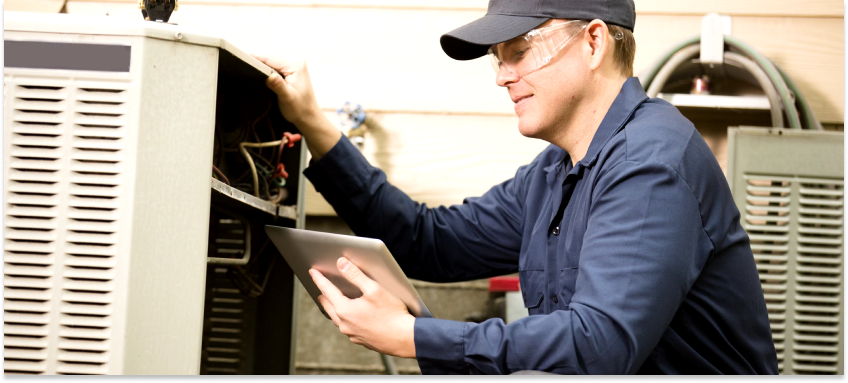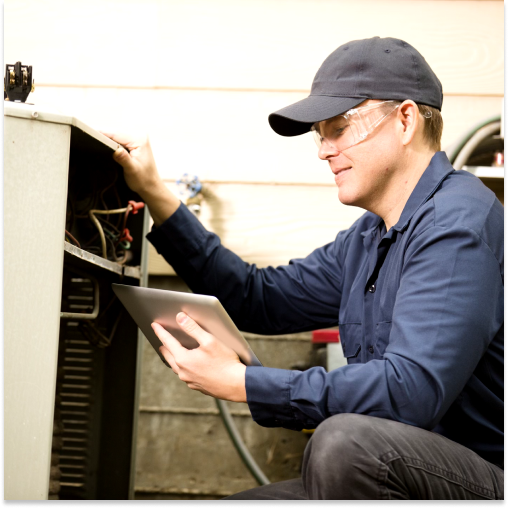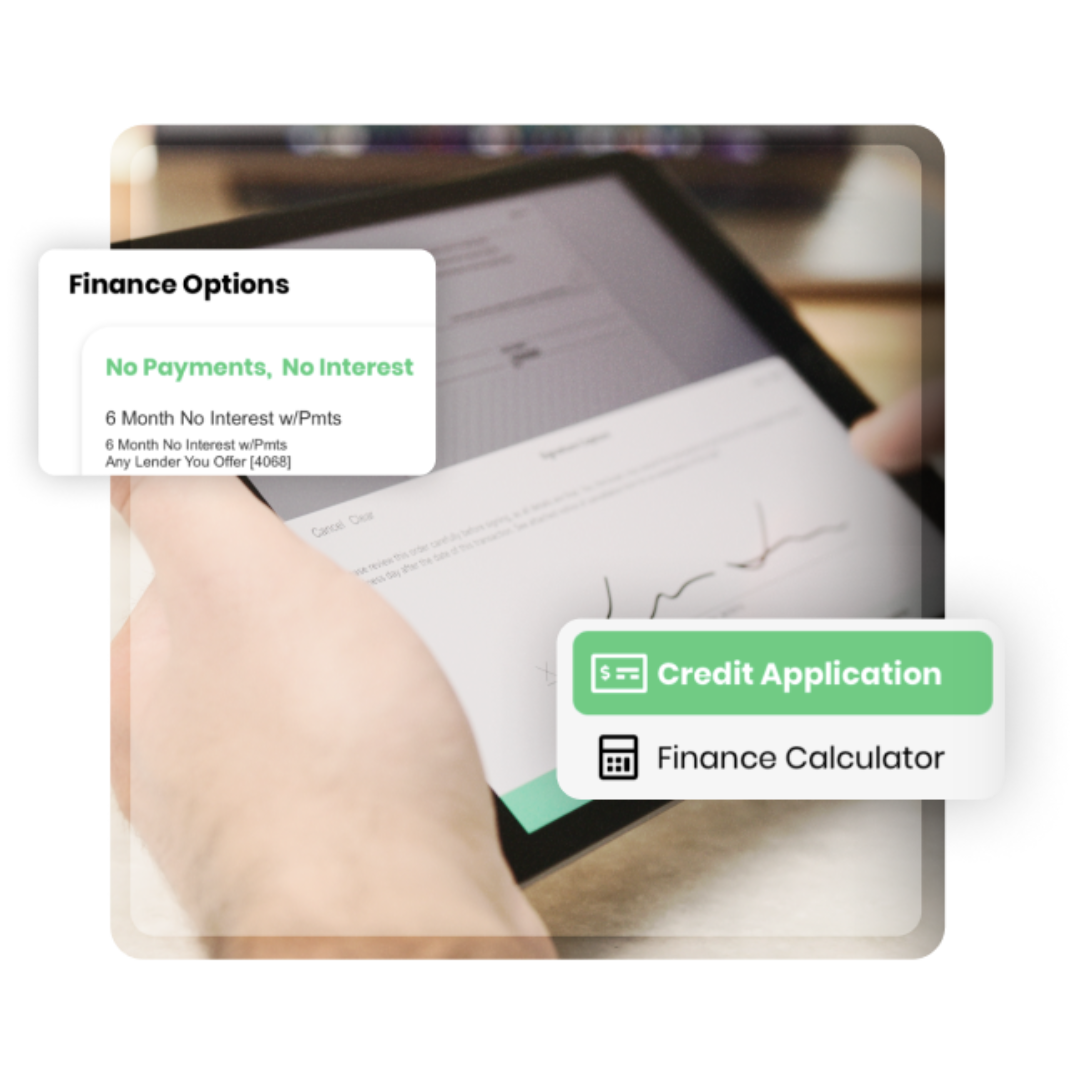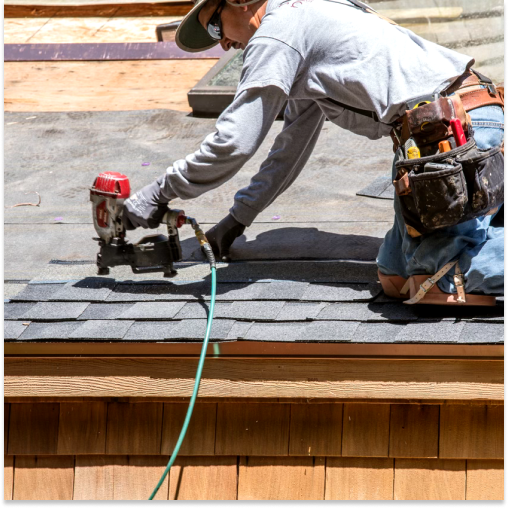The HVAC sales process is vital for contractors looking to grow their HVAC business. Specifically, this process involves several stages that are crucial for building trust with homeowners.
By mastering the sales journey, you can improve your strategy, widen your margins, and win more jobs overall. Therefore, let’s dig into the many stages of sales that HVAC professionals need to know inside and out.

Understanding the Role of HVAC Sales
HVAC contractors install, maintain, and repair heating, ventilation, and air conditioning systems. In general, they work directly with homeowners to ensure comfort and energy efficiency in their homes.
During the sales process, you must be able to inspect systems, diagnose issues, and provide tailored solutions. Moreover, you need to explain complex systems in simple terms. Homeowners rely on your expertise to make informed decisions.
The process begins with an initial assessment of the homeowner’s needs. During this initial meeting, you should recommend options that suit the homeowner’s budget, preferences, and existing systems.
Once an agreement is in place and a contract is signed, the work can begin. This is where the expertise and craftsmanship of your business comes into play. However, there are many different types of jobs you will come across.
Maintenance is another important aspect of HVAC work. Regular check-ups ensure systems run efficiently. This also reduces energy costs and extends equipment life.
When repairs are necessary, it’s important to act quickly. Identify the problem, propose solutions, and schedule the repairs as soon as possible. This minimizes downtime and ensures homeowners remain comfortable.
Overall, the relationship between HVAC contractors and homeowners is built on trust. It’s the contractor’s job to provide expertise, ensuring systems operate efficiently and safely. They guide homeowners through the process, from sales and installation to maintenance and repairs.
This customer-focused approach is essential for success in the HVAC industry. That’s why many of the most successful contractors rely on HVAC management software for their operations.
Stages of the HVAC Sales Process
For HVAC contractors, the sales experience can make all the difference between a won or lost job opportunity. However, many companies don’t have an efficient process to perfect each stage of the sales journey. And as a result, their sales are subject to costly errors that cut into their margins and lower their closing rates.
For instance, the main stages of the HVAC sales process include:
- Qualifying Leads
- Setting an In-Person Appointment
- Completing an Inspection
- Creating an Estimate
- Signing a Contract
- Following Up
Having a streamlined strategy for each stage will give you a competitive edge in your service area. In fact, each stage influences the next.
With the right systems and processes in place, you can create a winning culture that eliminates common sales mistakes altogether. So, let’s take a closer look at each stage below.
1. Qualify Leads
Qualifying leads is the first step in the HVAC sales process. It involves identifying potential customers who are interested in your services.
Contractors use various methods to generate HVAC leads. This can include online marketing, advertising, referrals, and promotions among other things.
Once leads are generated, you must determine their quality. Not all leads will turn into sales. Therefore, it’s essential to identify those with the highest potential. This involves asking the right questions.
Inquire about the homeowner’s current system, budget, and timeline. This information helps in determining if the lead is worth pursuing.
Communication is key during this stage. You need to listen carefully and provide relevant information. Moreover, educate homeowners about your services and explain how you can solve their problems. This builds trust and sets the foundation for a successful sales process.
Qualifying leads saves time and resources. By focusing on quality leads, you can improve your chances of closing deals and save your business time and money.
2. Schedule an In-Person Appointment
Once the leads are qualified, the next step is setting up an in-person appointment. This is crucial for building rapport with the homeowner. Additionally, it provides an opportunity to discuss their needs in detail and showcase your expertise.
Scheduling the appointment should be convenient for the homeowner during the HVAC sales process. Contractors need to be flexible and offer multiple time slots. This demonstrates respect for the homeowner’s schedule and sets a positive tone for the interaction.
During the appointment, always be prepared. Bring the necessary tools and sales collateral to help you close the deal.
The main goal of the appointment is to understand the homeowner’s needs. Make sure to ask questions and listen attentively. You will also need to assess the current system and discuss potential solutions. So, let’s move on to the inspection.
3. Complete an Inspection
The inspection is a critical part of the initial appointment. It involves a thorough examination of the homeowner’s current HVAC system. This step provides valuable insights into the condition of the equipment and the home’s overall comfort needs.
You always start by inspecting the existing system. Check for issues like wear and tear, leaks, or inefficient operation. You also want to evaluate the system’s age and determine if it meets current standards. This information helps in deciding whether a repair or replacement is necessary.
Next, assess the home’s specific needs. You may need to measure the space, check insulation, or evaluate airflow. These factors are important for determining efficient HVAC solutions.
During the inspection, communicate your findings to the homeowner clearly. Explain any issues and offer recommendations. This transparency builds trust and helps the homeowner understand the importance of the proposed solution.
In general, a detailed inspection sets the stage for creating an accurate estimate. It ensures all aspects of the project are considered and leads to a more effective and customized solution.
4. Create an Estimate
Most contractors would say the estimate is the key to a successful HVAC sales process. To be specific, it provides the homeowner with a detailed breakdown of the project costs. This includes equipment, labor, materials, and any additional services. The estimate should be clear, accurate, and easy to understand.
During this phase, consider the homeowner’s needs and the type of system required. This helps in determining the appropriate equipment and materials.
Next, you need to calculate the costs. This involves considering the price of the HVAC unit, installation fees, labor rates, and any necessary permits. Contractors should also include potential additional costs, like ductwork or electrical upgrades if applicable. Providing a comprehensive estimate ensures there are no surprises later.
Transparency is key when presenting the estimate to the homeowner. Therefore, explain each item and its purpose. You also need to highlight the benefits of the proposed system and how it will improve the homeowner’s comfort and energy efficiency.
5. Sign a Contract
After the estimate is reviewed and agreed upon, the next step is signing a contract. The contract is a formal agreement between the contractor and the homeowner. It outlines the scope of work, costs, and terms of the project. This document protects both parties and ensures everyone is on the same page.
The contract should be detailed and clear. It should include the project timeline, payment schedule, and any warranties or guarantees. Also specify the equipment and materials that will be used. This ensures the homeowner knows exactly what to expect.
It’s important to review the contract with the homeowner before they sign. Go over each section and answer any questions. Overall, this helps in avoiding misunderstandings and ensures the homeowner is comfortable with the terms.
Offering financing options can also be beneficial. Many homeowners may not have the funds for an upfront payment. By providing financing, you make it easier for homeowners to commit to the project.
Once the contract is signed, the project can begin. Always provide a copy to the homeowner for their records. This document serves as a reference throughout the project, ensuring everything goes according to plan.
6. Always Follow Up
Following up is an essential part of the HVAC sales process that is often overlooked. It involves checking in with the homeowner after the project is completed. This shows your commitment to customer satisfaction and helps in building long-term relationships.
Always contact the homeowner to ensure they are satisfied with the work. In some cases, this gives you the chance to address any concerns or issues that may have arisen. This proactive approach demonstrates a dedication to quality and customer service.
In addition, following up provides an opportunity to offer additional services. You can discuss maintenance plans or recommend upgrades in the future.
Staying in touch with past customers can also lead to referrals and five-star reviews. As a matter of fact, satisfied homeowners are more likely to recommend your business to friends and family. This can generate new leads and contribute to the growth of your business.
How Leap SalesPro Can Help HVAC Contractors
Leap SalesPro is a powerful tool for HVAC contractors to streamline the sales process. It’s built by contractors to make it easier to create accurate estimates and work with homeowners. Moreover, you can quickly turn estimates into proposals and signable contracts.
The software allows you to build estimates quickly and eliminates manual errors completely. This accuracy helps in gaining the homeowner’s trust, protects your margins, and increases the chances of closing the deal.
Leap SalesPro also simplifies the in-home sales experience. You no longer have to dig through product sheets and rely on chicken-scratch handwriting for your documentation. All-in-all, the software saves your sales reps time during each appointment to focus on selling the job itself.
In addition, Leap SalesPro helps in managing the entire sales process. It tracks all customer interactions, stores customer information, and gives you the ability to manage your schedule.
This organization ensures nothing falls through the cracks and improves overall efficiency. By using Leap SalesPro, HVAC contractors can save time, reduce errors, and provide a better experience for the homeowner.
So, are you ready to improve your HVAC sales process? Fill out the form below and schedule a quick demo to see how Leap SalesPro can give your profits a boost!




